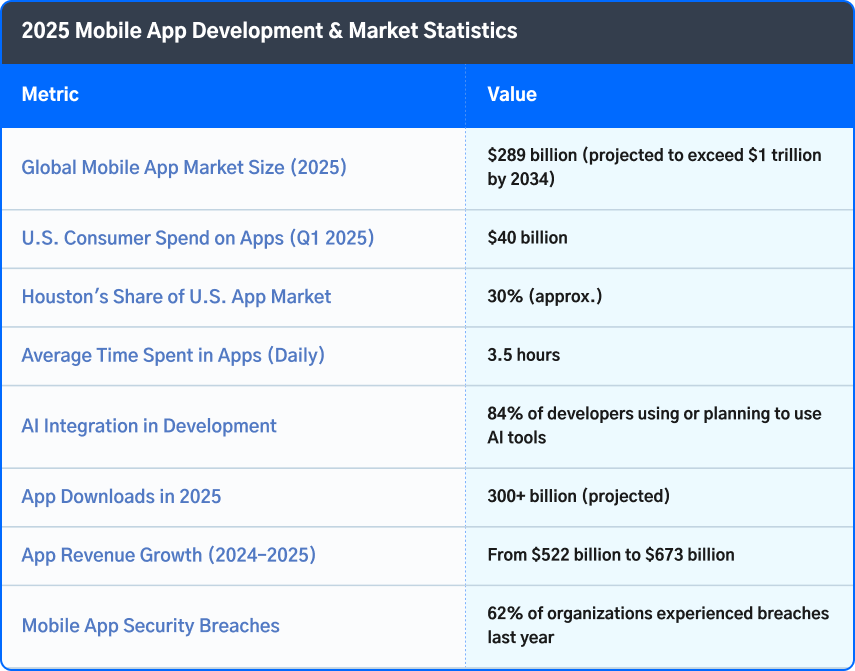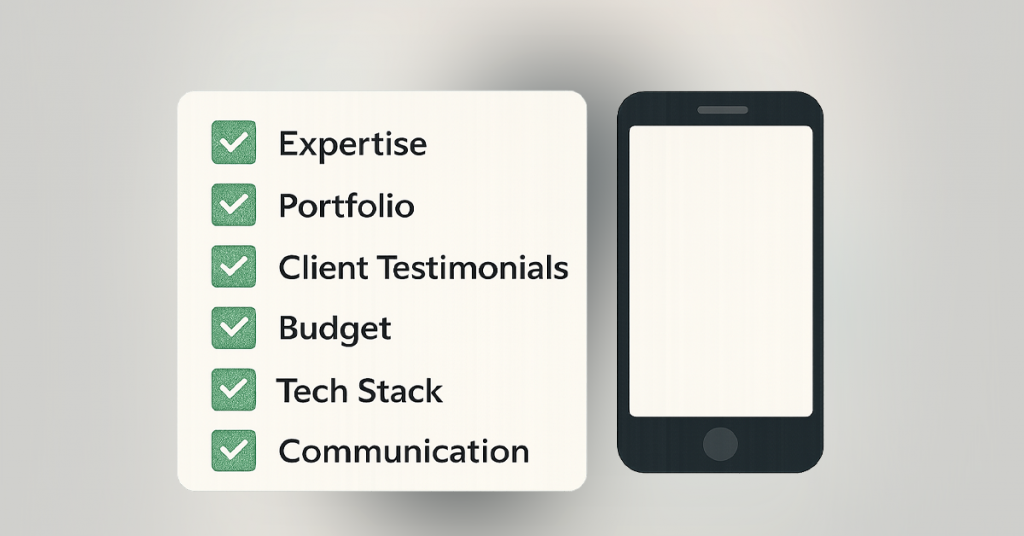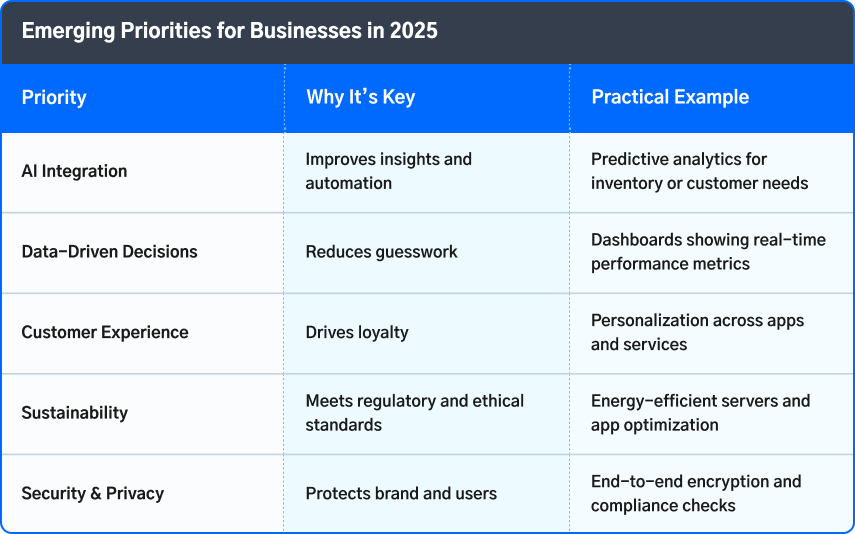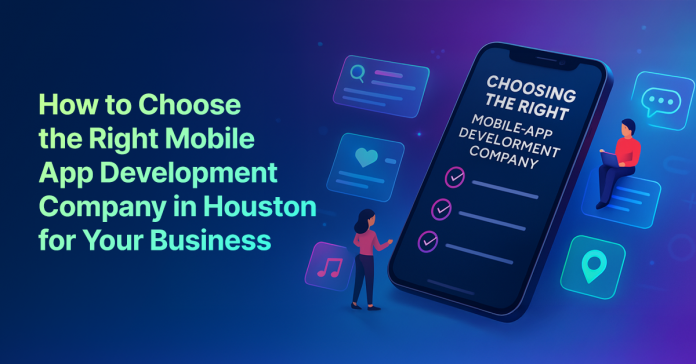Houston’s business environment is undergoing many changes. In every sector, from energy and logistics to healthcare and retail, there is a notable implementation of technologies. For many local companies, investing in mobile application development in Houston is no longer optional. It’s a way to stay relevant in a market that moves quickly and expects convenience.
Yet choosing the right mobile app development company in Houston is not simple. Houston’s tech ecosystem has grown crowded, filled with agencies that claim expertise in numerous fields. The wrong choice can slow growth and waste valuable time.
A good development partner does more than build an app. They understand your industry, your customers, and your business model. They translate that understanding into a product that solves real problems. This guide breaks down how to find such a partner. It explains what to look for, what to avoid, and how to ensure lasting value from your investment.
Houston’s Growing App Ecosystem Explained
Houston’s technology ecosystem has shifted from quiet progress to visible momentum. The city, once known mainly for oil and healthcare, now shows a clear rise in digital-first enterprises. Local firms no longer view apps as side projects. They see them as growth engines that integrate with real business systems, from logistics tracking to energy analytics.
This new phase of mobile app development is not about flashy consumer apps. It’s about function, security, and scale. Many businesses here build tools that connect field workers, supply chains, and clients in real time. App developers in Houston are expected to handle complex integrations with legacy systems, industrial IoT platforms, and compliance frameworks. That technical depth defines the city’s growing app ecosystem.
Another shift comes from mindset. Companies are hiring partners who bring product strategy, not just coding. They expect collaboration from day one, starting with research, wireframes, and user flow mapping to launch and maintenance. Houston’s enterprises prefer teams that think beyond delivery schedules and understand long-term digital goals.

Why is Choosing the Right Partner Important?
Impact on Business Outcomes
- Selecting the wrong development partner can slow progress. Delays in launch affect customer engagement.
- Poorly designed apps frustrate users and reduce adoption. Beyond technical issues, mistakes in execution hurt credibility.
- For Houston businesses, where operations often involve compliance and high-value assets, these risks are amplified.
Beyond Technical Delivery
- A good partner delivers more than code. They understand your workflows, customer needs, and industry pressures.
- They anticipate challenges and provide practical solutions. This foresight reduces trial-and-error and cuts development costs.
- Teams that act strategically save time and resources. They focus on results, not just features.
Operational Efficiency
- The right partner streamlines your internal processes. Prompt communication prevents confusion.
- Thoroughly documented systems allow your team to manage and scale apps without the help of outsiders.
- Internal teams without clear direction simply end up debugging instead of inventing anything new. Efficient cooperation ensures milestones remain on track and quality is high.
Long-Term Value
- The choice of a long-term vision for a partner ensures your application evolves with your business.
- They expect maintenance, upgrades, and scalability on day one. This avoids redevelopment over and over, along with unnecessary expenses.
- A good partnership ensures iterative refinement, rather than a single time deliverable.
Strategic Advantage
- Ultimately, the correct partner can make a meaningful impact on your competitive edge.
- In Houston, business needs applications that don’t just operate effortlessly but also yield insight, automation, and customer experience that make them authentically differentiated.
- A trusted, educated partner makes the technology a strategic business asset.
What to Look for in a Mobile Development Team

Technical Expertise and Modern Tools
Technical skills form the core of a high-performing mobile app development company in Houston. A firm must select a partner that shows experience with native technologies and cross-platform technologies. Inquire about their approach to next-gen technologies such as AI, automation, and analytics.
Industry and Domain Experience
Designs that stand out are less important than a company’s portfolio. Search for projects like your industry, say energy, health, logistics, or retail. Houston app development poses specific development and compliance challenges. Developers who are experienced in your area foresee potholes and create efficient solutions. Experience relevant to the industry also quickens development, for the team is aware of workflow, data needs, and compliance considerations.
User Experience and Design Thinking
Adoption is founded on a good design. Think about how companies treat user experience. Great teams commit to quick prototyping, user testing, and iterative refinement. They don’t make template-informed decisions but create flows based on real user activity. Accessibility, performance, and simplicity must be pillars, not afterthoughts.
Transparency and Communication
Just as much as a developer’s skills, a partner’s approach to working is critical. Insist on open ways of explaining things, regular reports, and progress updates. Find out how they approach changes and feedback. Step-by-step or agile approaches tend to work best, informing you at each step. Openness minimizes risk and helps create confidence. Without openness, even sound projects go wrong.
Security and Compliance
Security is uncompromisable. Firebase tops the list of leading mobile analytics and CRM SDKs on Android with 99% and 40% integration reach, respectively, in 2025. This shows that a majority of app developers in Houston depend on secure, scalable third-party solutions for increasing app functionality and compliance. Make sure the company uses encryption, safe storage, and tests for weaknesses. For healthcare or finance apps, check if they have experience with HIPAA or other rules. A company that thinks about compliance later can put your business in danger.
Maintenance and Scalability
Apps require constant maintenance. Inquire about post-launch support, update frequency, and tech problems. Scalable design allows your app to scale along with your business. Teams that anticipate scaling can prevent costly alterations down the road. Consider monitoring and alarm features to maintain a smoothly-operating app. An organization that provides long-term maintenance within its service ensures strong performance long term.
Legal and Contractual Considerations
Contracts safeguard your business as well as your intellectual property. Confirm ownership of code, library licensing, and warranty terms. Acceptance criteria should be defined, with measurable milestones. Payment terms should match deliverables. Endorse the knowledge transfer and exit strategies terms. A comprehensive contract avoids disputes and protects investment.
Pilot Projects and Cultural Fit
Short pilot projects reveal compatibility. They expose communication gaps, technical speed, and quality of work. Cultural alignment matters. A team that matches your pace and values will collaborate effectively. Evaluate problem-solving, responsiveness, and decision-making during the test.
Scoring and Decision Framework
Utilize an objective scoring framework for comparisons between vendors. Assess technical talent, design capabilities, security policies, communication, and cross-cultural fit. Consider criteria weighted according to business imperatives. A lower-cost solution should never have sole determining power. At times, a more expensive partner provides greater value along with less risk at a longer distance. Report findings for a clear, defensible selection decision.
Pricing, Value, and ROI Simplified
Understanding Pricing Structures
Pricing of mobile app development in Houston comes in several forms. Fixed-price contracts offer predictability but can limit flexibility. Time-and-materials models allow adaptability but require careful oversight. Houston businesses should understand which structure aligns with project complexity. A transparent pricing model reduces surprises and ensures smoother collaboration.
Total Cost of Ownership
Development expense is just a part of the cost. Hosting, maintenance, upgrades, and licensing accumulate over time. Account for the expense for future scalability and enhancements for features. Up-front planning for such aspects saves companies repeated redevelopment. A clear-eyed perspective on overall ownership facilitates setting a budget and preventing hidden costs.
Assessing ROI
Return on investment depends on both efficiency and adoption. An app that streamlines internal operations saves costs. One that enhances customer engagement drives revenue. Ask vendors how they measure success and impact. ROI should be assessed against business goals, not just completion of the project.
Value Over Price
Inexpensive solutions might appeal, but they mask danger. Poor implementation, support, or technical debt outweighs early dollar savings. Expensive companies generally produce repeatable results and payoffs on a long-term scale. Focus on reliability, experience, and maintenance, rather than short-term dollar savings.
Phased Approach for Measurement
Think short-term, staggered deliveries against measurable results. Entering the market gradually facilitates evaluation of adoption, performance, and ROI. Refine strategy, budget based on information generated at each phase. This manages risk, ensures investments track business goals.
Warning Signs in Vendor Selection
Vague Timelines and Deliverables
- If a vendor cannot provide clear schedules, expect delays. Promises of extremely fast delivery are often unrealistic.
- Deliverables should be well-defined with measurable milestones. Without this clarity, projects risk overshooting budgets and deadlines.
Poor Communication
- Communication lapses are costly. Vendors who respond slowly or avoid updates create friction.
- Regular updates, demos, and feedback loops are essential. A lack of transparency early often predicts ongoing problems.
Limited or Irrelevant Portfolio
- A sparse portfolio is a warning sign. Projects should reflect similar industries or technical challenges.
- Firms that cannot show relevant experience may struggle with your specific requirements.
No Post-Launch Support
- Support after launch is critical. Avoid partners who do not provide maintenance, updates, or troubleshooting.
- Post-launch support ensures apps remain functional, secure, and aligned with evolving needs.
Unclear Intellectual Property and Legal Terms
- Code ownership, licensing, and warranties should be well stated in the contract.
- Do not deal with companies whose legal protection is dodgy or non-existent. Intellectual property disputes cost a lot of money and time.
Overreliance on Templates
- Using pre-built templates is not inherently bad, but excessive reliance can indicate a lack of customization.
- Your app should reflect unique business processes, not a generic solution.
High Turnover or Unstable Teams
- Continuous staff changes create discontinuity. Inquire about team stability and consistency of leadership.
- High-turnover teams might have problems with knowledge transfers and long-term support.
Lowball Pricing Without Detail
- Extremely low quotes often hide missing features or shortcuts. Prioritize transparency and realistic pricing over cheap options.
- The cheapest vendor can end up costing more in fixes and delays.
Houston Success Stories and Emerging Trends
Enterprise-Driven Mobile Solutions
Houston companies increasingly rely on apps to manage complex operations. Energy firms use mobile tools to track field assets in real time. Logistics providers adopt apps for route optimization and inventory monitoring. These projects show how mobile development can directly improve efficiency and decision-making.
Data-First and AI Integration
Regional developers are incorporating analytics and artificial intelligence into commercial applications. Automated maintenance that is predictive, reporting that is automatic, and customer-related information are fast becoming common features. Organizations that have such functionalities enjoy faster response time and better forecasting capabilities. This trend reflects increasing expectations that applications deliver measurable intelligence rather than simple interface functionality.
Long-Term Strategic Partnerships
Successful projects for Houston are frequently multi-year relationships. Vendors follow clients after a launch for recurring updates, iterative refinements, and maintenance. These relationships maintain relevance for apps when business needs evolve. Long-term partnership-focused teams instill confidence and enable long-term digital maturity.

Turning App Projects into Long-Term Wins
Begin with clear goals for the project and a feasible schedule. Running a small-scale trial or test project helps gauge the partner’s approach, pace, and quality of output. Assess for technical competence, design, communications, and culture fit. Documentation and openness matter at all times. Contracts should safeguard your intellectual property, spell out ownership, milestones, and support after deployment.
Long-term value is created through repeated collaboration. Great partners report regularly, make iterative refinements, and undertake proactive maintenance. They foresee problems and suggest solutions ahead of time when problems might develop. Through a strategic relationship, your app matures with your business instead of growing stagnant.
Investing in a trusted, expert partner lowers risk and drives results faster. It makes your technology an asset, not a liability. For a competitive, dynamic market like Houston, this decision can create your digital differentiation.
Key Takeaways:
- Irrespective of how good your team is, the right development partner is crucial for success. The partnership should align in key areas like industry insights, vision, and business goals.
- Today, knowledge in tech stretches across fields. This includes AI & models, cloud systems, cross-platform technologies, automation, etc.
- Since the application is the interface for your services, it needs to be clear and smooth. Make sure your team prioritises design, navigation, readability, and optimisation.
- Transparent communication and disclosure contribute to maintaining project momentum, with consistent reporting, iterative processes, and proactive feedback, thereby minimizing risk.
- Compliance and security must not be compromised, as partners should exhibit robust encryption, regulatory knowledge, and proactive vulnerability management.
- Factors related to maintenance and scalability must be incorporated into the project from the very beginning, ensuring that the application adapts alongside the business while maintaining its efficiency over time.
- Short pilots allow for exploration of cultural alignment, teaming, and alignment of your business strategy, frequently paving the way for long-term deals.
- The costs should always be judged in a context, with a focus on long-term value, reliability, and payback on investment, rather than individual attention on first pricing.
- The smartphone ecosystem for Houston is defined by solutions-driven business, data-centric planning, AI-enabled solutions, and multi-year collaborations that make apps relevant and effective for the long run.
- Establishing a strategic partnership with an appropriate collaborator facilitates the growth of your application in tandem with your business, thereby generating a significant competitive advantage and fostering enduring digital distinction.
FAQs
Q. How can a development partner’s deep knowledge of Houston industries shape the success of an app?
Ans. A partner with knowledge and expertise in your field of project is important. In industries like logistics and healthcare, with complex processes, it helps during bottlenecks. This can range from issues in data management, workflow, execution, etc. Such a partnership results in applications that seamlessly integrate with existing systems.
Q. Why is cultural and communication alignment crucial when choosing a mobile app development company?
Ans. Your teams, which embody your problem-solving style, responsiveness, and decision-making, are more suitable for your internal stakeholders. This minimizes misunderstandings, enables rapid development, and results in a final product that embodies your company culture.
Q. How do pilot projects help mitigate risks before committing to a long-term engagement?
Ans. Short-duration trials constitute a pragmatic method for validating the technological capabilities, team interactions, and collaborative processes. They demonstrate the responsiveness of a vendor when addressing feedback, adjusting priority shifts, and enabling progress communications.
Q. How can a data-first and AI-integrated approach transform a business app’s impact?
Ans. Going beyond fundamental functionality, a data-driven application has the potential to offer predictive insights, enhance operational workflow, and tailor the experience according to users. This feature enables organizations to anticipate consumer demands, enhance processes, and evaluate outcomes efficiently.
Q. What hidden costs often go unnoticed when evaluating mobile app development?
Ans. Besides the one-time build, there are recurring expenses such as cloud hosting, licensing, integration with older infrastructure, maintenance, and support. Planning for them upfront saves the surprise element and guarantees the investment delivers value for the long haul.
Q. How can a long-term, strategic partnership with a development vendor enhance competitiveness?
Ans. An interested partner goes beyond simple application deployment; they are a catalyst for continued refinement. Regular updates, iterative refinement, and proactive resolution of problems allow the application to grow side by side with your enterprise.
Q. Why does cross-industry experience in a development team add value to your app project?
Ans. Experts who have experience across many industries regularly use creative problem-solving techniques, anticipate unexpected roadblocks, and combine best practices. This wide experience makes them qualified to deliver solutions that are adaptable, original, and specific to functional implementation scenarios.






